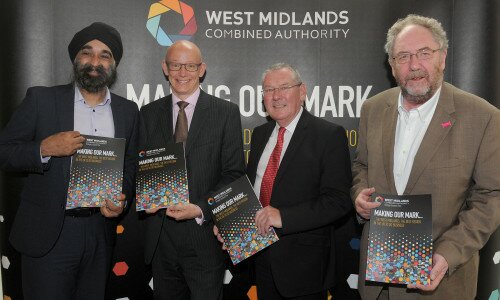
West Mids mayor gets thumbs-up, but questions asked about ‘biased’ consultation
Most people are comfortable with the idea of handing responsibility for transport, skills, housing and economic development to the West Midlands Combined Authority overseen by an elected mayor, according to the results of a seven-week consultation exercise.
More than 1,300 submissions were received in both online and hard copy formats from members of the public, council representatives, and organisations, although fewer than 100 responses were received from businesses.
Critics have accused WMCA of bias by arranging the survey around a list of nine ‘leading’ questions which set out the advantages that would flow from the West Midlands devolution package, and then asked respondents whether they agreed or not.
Each question spoke about powers to be given to the ‘Mayoral WMCA’ and did not give any detail about powers to be handed to the mayor, which will be severely diluted if proposals by the leaders of the seven West Midlands metropolitan councils are accepted by the Government.
Under WMCA’s proposals the mayor, to be elected next May, can have their budget and policies rejected by the council leaders and will possess little in the way of direct executive power.
While the mayor will be handed the Homes and Communities Agency’s compulsory purchase order powers, the mayor would require the consent of the appropriate councils.
The first of the nine questions, on transport, began by reminding respondents of the region’s well know shortcomings: “Getting around the West Midlands by car or public transport is not as easy as we would like it to be. For instance, congestion is costing the regional economy around £2 billion per year. Ensuring our residents and businesses can reach job opportunities across the region is key to economic growth and success.”
It continued: “By devolving functions to a Mayoral WMCA, the region will be able to create a more efficient, integrated West Midlands transport network, specifically a Key Route Network of local roads.”
Perhaps unsurprisingly, a total of 79 per cent of respondents strongly agreed or agreed with the proposal that by devolving powers the region could create a more efficient, integrated West Midlands transport network.
There was similar strong backing for handing the mayoral WMCA powers to tackle emissions, deliver more housing and economic growth strategies, although giving the combined authority the power to raise taxes received more lukewarm support. Revenue-raising powers were supported by 54 per cent and opposed by 35 per cent, with 11 per cent undecided.
The introduction to a question about emissions stated: “In some areas of the West Midlands region, air quality is very poor. Air quality however, is not limited by council boundaries which makes tackling it on an individual council basis difficult. By devolving functions to a Mayoral WMCA, the region and partners will be able to create and deliver low emissions and clean air zones, thus improving public health.”
Some 71 per cent of respondents agreed the mayoral WMCA should get those functions, while 24 per cent disagreed.
On the issue of high speed rail, the survey stated “By devolving functions to a Mayoral WMCA, the region and partners will be able to make sure HS2 benefits the whole West Midlands region through the creation of a combined authority-led development corporation. This will include the Metro extensions from Curzon in central Birmingham to Solihull HS2 Interchange Station and from Wednesbury to Brierley Hill.”
Respondents were then asked: “To what extent do you agree or disagree that the Mayoral WMCA should get the functions highlighted above, and detailed in the HS2 growth section of the Mayoral WMCA Functions Scheme, to deliver these ambitions?”
Some 65 per cent of respondents agreed that the Mayoral WMCA should get the functions highlighted.
Councillor Bob Sleigh, the leader of Solihull council and chair of the WMCA, said:
The summary of consultation responses shows broad support for how a mayoral combined authority will work to deliver the first devolution deal.
A condition of our first devolution agreement was an elected mayor.
We have accepted this because of the significance of the agreement to the region’s economy – an extra £36.5 million a year to the region over the next 30 years – which will unlock an £8 billion investment package.
The West Midlands devolution deal was signed last November between the WMCA – which comprises the seven metropolitan councils as well as a number of adjoining shire districts and counties – and the government.
It will see Whitehall make an annual contribution worth £40 million for 30 years to support an overall investment package that will unlock £8 billion, alongside the creation of up to half a million jobs.
In return the region agreed that a mayor should be elected – the election is scheduled to take place on May 4 2017.
.
Similar Articles
Council: Panel stands down, but recommends another one pop up
The Panel set up to oversee improvements to Birmingham city council has disbanded itself and
Brexit Watch: The List
We are living though extraordinary political times. The only thing to do in such circumstances
Birmingham City Council – a beacon (yes, you read that correctly)
They’re a tricky business, industrial relations, and I normally steer well clear. However, when the
Region needs more jobs, higher skills and better housing – report
A new report into economic injustice in Birmingham and the Black Country paints a stark
The ins, outs and whereabouts of fly-tipping
On the day Birmingham's latest bin strike starts up, Chris Game throws a political dead










